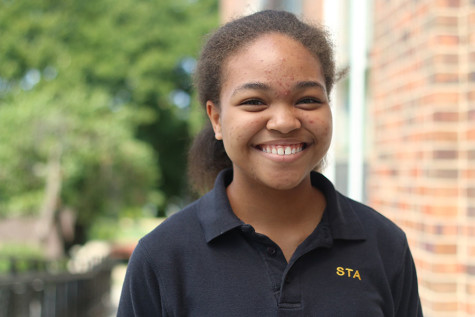Confessions of a Black Girl: How to take a stand
Watch the video or read the post. Don’t forget to leave a comment!
December 8, 2015
Hey everyone! I just want to clarify something for you all: I’m not trying to speak for all black people in these blogs. If you’re watching this in the right mindset, you’ll realize you’re just hearing the thoughts and perspective of one black girl who is also a unique human being with an experience that no one else has ever had. However, I am living life as a minority, so my experience is different than a lot of girls at STA, and that’s why I want to share it with you.
When I say “we’re not so different after all,” I’m referring to me and you, viewer (or reader). No matter what color or gender or age, we’re sharing this human experience, and life is a pretty crazy thing. We all experience happiness, anger, love, hurt. In that way, we have more in common than we might think if we just judged from outward appearances.
Alright, so here’s the question of the week: What is the best way for people who are not black to stand up to racism and racial injustice? I feel that in my experience, my actions may be taken the wrong way and are seen as overbearing. I just want to help fight the good fight! How can I do so in a way that is respectful and helpful?
I appreciate this question so much because it means this person cares enough to want to help and has obviously already been trying to do so. People may tell you it’s overbearing to think you can speak for a group you don’t belong to, but I think it’s overbearing for people to tell you what you can and cannot do, especially when you’re following your conscience.
People who say or act as if you’re overbearing may just feel intimidated by you. For instance, if you’re saying something that they don’t agree with, the easy target would be “you’re not even black, how would you know?”
And sometimes, even those you’re trying to stand for may seem to be against you. Sure, you can’t speak as an African-American, but I don’t see the problem with standing for them. Others might not agree. I’d encourage you to listen what they say. Take it into consideration, but don’t stop fighting. You won’t always be right, but at least you’re standing for something.
The Civil Rights Movement wasn’t just fought by African-Americans. It was fought by people of all colors and nationalities. It was fought by humans who stood for the rights of humans, and that’s a beautiful thing. I found this great article about how whites were essential to the Civil Rights Movement, and I suggest you read it!
For things you could do every day, my advice would just be to speak out. Don’t let your friends or family make racist comments without checking them. Don’t sit quietly while people act unjustly. It seems small, but you never know whose perspective you could change.
However, try not to make a big deal of yourself either. It is overbearing when a non-black person talks about the African-American experience more than a black person would. Come from a place of humility, realizing that you cannot know what it’s like to be black if you aren’t, but also realizing that if you are in a position of privilege, you not only have the the ability to make a change, you have the responsibility to do so.
Lastly, people will also really respect you if you aren’t all talk. I mean, I’m sure people in the Civil Rights Movement had a lot to say about the injustices blacks dealt with, but when they went out and marched alongside those they were trying to help, it made a statement words never could.
No matter what color you are, it’s important to fight for justice – whether it’s justice for your own community, or for people you’ve never met.
As Dr. Martin Luther King said, “No one is free until we are all free.”
Leave your questions in the Google form or comment down below.
Thanks and I’ll see you next time.



